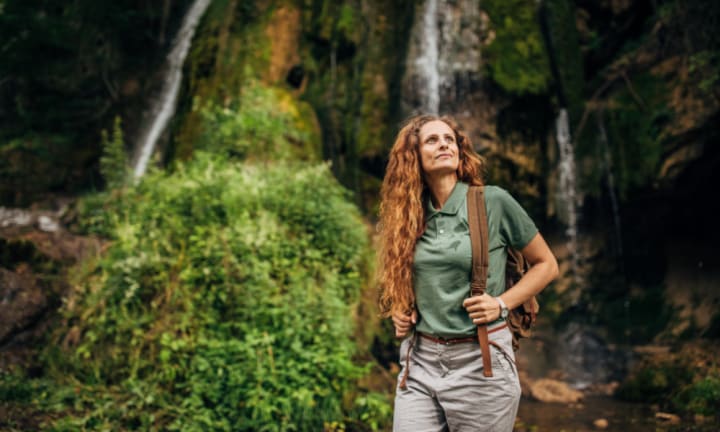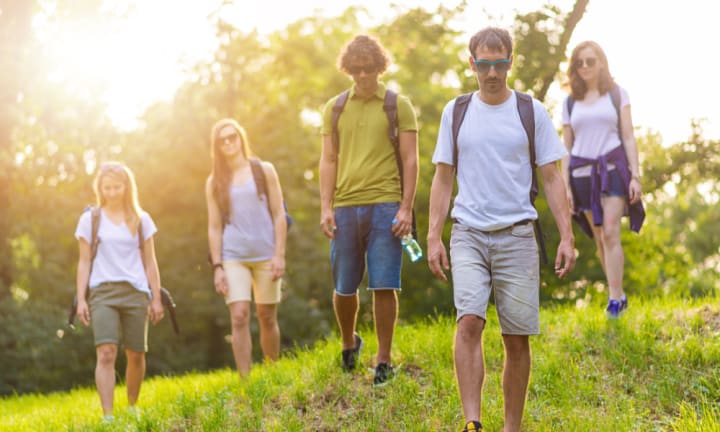A Solo Traveler's Guide to Exploring Africa
Discovering Local Cultures, Nature and Wildlife, and Maintaining Health and Wellness on Your Solo Journey.

Introduction:

Solo travel has become increasingly popular in recent years, and for good reason. Traveling alone can be an incredibly rewarding and transformative experience. It allows you to step out of your comfort zone, challenge yourself, and gain a deeper understanding of the world and yourself. And if you're looking for an exciting and diverse destination to explore on your own, Africa is the perfect choice.
Africa is a continent of incredible natural beauty, fascinating cultures, and welcoming people. From the savannahs of Kenya and Tanzania to the beaches of Zanzibar, from the deserts of Morocco to the mountains of Ethiopia, Africa offers a wealth of experiences for solo travelers. But planning a solo trip to Africa can be daunting, especially if you're not familiar with the continent. That's where this guide comes in.
"Lost in Wander: A Solo Traveler's Guide to Exploring Africa" is a comprehensive resource for anyone who wants to embark on a solo adventure in Africa. Whether you're a seasoned traveler or a first-time explorer, this book will provide you with the information, inspiration, and practical advice you need to plan and enjoy a safe, fulfilling, and unforgettable trip.
In the following chapters, we'll cover everything from planning your trip and getting around to experiencing local culture and exploring nature and wildlife. We'll also discuss health and wellness considerations, as well as tips for staying safe and making the most of your solo adventure. By the end of this guide, you'll be ready to pack your bags, set out on your own, and get lost in wander in Africa.
Planning Your Trip

Sure! Here's an example of what the "Planning Your Trip" chapter of "Lost in Wander: A Solo Traveler's Guide to Exploring Africa" could look like:
Chapter 2: Planning Your Trip
Planning a solo trip to Africa can be both exciting and overwhelming. There are many factors to consider, such as where to go, how to get there, where to stay, and how much to budget. In this chapter, we'll guide you through the process of planning your solo adventure in Africa, from choosing your destination to finding accommodation.
Section 2.1: Choosing Your Destination
Africa is a vast continent with 54 countries, each with its own unique culture, history, and natural wonders. Choosing the right destination for your solo trip can depend on your interests, budget, and travel goals. Some popular destinations for solo travelers in Africa include:
Kenya: Known for its wildlife safaris, stunning landscapes, and vibrant culture.
South Africa: Offers a mix of urban experiences, wildlife safaris, and outdoor adventures.
Morocco: A popular destination for its colorful markets, historic cities, and desert landscapes.
Tanzania: Home to the Serengeti National Park, Mount Kilimanjaro, and beautiful beaches.
Egypt: Known for its ancient history, pyramids, and vibrant cities.
While these are just a few examples, there are many other destinations to consider. Researching different options and reading travel guides and blogs can help you narrow down your choices and choose the destination that best suits your interests and preferences.
Section 2.2: Getting Visas and Other Necessary Documents
Before you travel to Africa, you'll need to obtain a visa for the country you plan to visit. Visa requirements can vary depending on your nationality and the country you're visiting, so it's important to check the embassy website of the country you're planning to visit for specific requirements.
In addition to a visa, you may also need other necessary documents such as a passport, proof of vaccinations, and travel insurance. Make sure you have all the required documents before you leave for your trip to avoid any last-minute stress.
Section 2.3: Budgeting for Your Trip
Budgeting for a solo trip to Africa can depend on many factors, including your travel style, the country you're visiting, and the length of your trip. To budget for your trip, consider the following expenses:
Flights: Airfare can be a significant expense, so it's important to research flights and compare prices to find the best deal.
Accommodation: Hostels, hotels, and vacation rentals are all options for solo travelers in Africa. Research your options and consider your budget and comfort level when choosing your accommodation.
Transportation: Depending on where you're going and how you plan to get around, transportation costs can vary. Consider the cost of renting a car, taking public transportation, or hiring a driver.
Food and drink: Food costs can vary depending on where you're traveling in Africa. Research local restaurants and markets to find budget-friendly options.
Activities and tours: Activities such as safaris and tours can be a significant expense, so it's important to research your options and budget accordingly.
By researching these expenses and creating a budget, you can ensure that you have enough money for your trip and avoid overspending.
Section 2.4: Finding Accommodation
Solo travelers in Africa have many options for accommodation, from budget-friendly hostels to luxury hotels and resorts. Some popular accommodation options for solo travelers include:
Hostels: Hostels are a great option for budget-conscious solo travelers. They offer affordable dormitory-style rooms, as well as private rooms for those who prefer more privacy.
Hotels: Hotels range from budget-friendly to luxurious, and offer a range of amenities such
Getting Around

Sure, here's an example of what the "Getting Around" chapter of "Lost in Wander: A Solo Traveler's Guide to Exploring Africa" could look like:
Chapter 3: Getting Around
Getting around in Africa can be an adventure in itself. From bustling cities to remote villages, Africa offers a variety of transportation options for solo travelers. In this chapter, we'll explore different ways to get around in Africa and provide tips for staying safe and comfortable.
Section 3.1: Public Transportation
Public transportation in Africa can be an affordable and convenient option for solo travelers. Depending on the country, public transportation can include buses, minibusses, trains, and taxis. While public transportation can be a great way to experience local culture and interact with locals, it's important to take precautions to ensure your safety. Here are some tips:
Research transportation options before you arrive in a new city or town.
Avoid traveling at night, especially on public transportation.
Keep your valuables close and secure, and be aware of your surroundings.
If you're unsure about a situation or feel uncomfortable, trust your instincts and find another option.
Section 3.2: Car Rentals
Renting a car can be a great way to explore Africa on your own schedule. However, it's important to be aware of the challenges and potential risks of driving in Africa. Here are some tips for renting a car in Africa:
Research the driving laws and regulations of the country you're visiting.
Consider hiring a driver if you're uncomfortable driving on your own.
Make sure you have a valid driver's license and insurance.
Be aware of the potential for road hazards, such as potholes and wildlife.
Keep your car doors locked and windows up while driving in urban areas.
Section 3.3: Tours and Guided Activities
Tours and guided activities can be a great option for solo travelers who want to explore Africa's natural wonders and cultural sites with the guidance of an expert. Many tour companies offer group tours or private tours that cater to solo travelers. Here are some tips for finding the right tour for you:
Research different tour companies and read reviews from previous customers.
Consider the size of the tour group and the itinerary of the tour.
Ask about the qualifications and experience of the tour guide.
Make sure you understand the costs and what is included in the tour.
Section 3.4: Air Travel
Air travel is a common mode of transportation for long distances within Africa. There are many airlines that offer flights within Africa, and prices can vary depending on the season and the destination. Here are some tips for flying within Africa:
Research different airlines and compare prices and schedules.
Make sure you understand the baggage policies and fees of the airline.
Arrive at the airport with plenty of time before your flight.
Keep your travel documents and valuables with you at all times.
By understanding the different transportation options in Africa and taking precautions to ensure your safety, you can enjoy a safe and comfortable solo adventure in Africa.
Experiencing Local Culture

Here's an example of what the "Experiencing Local Culture" chapter of "Lost in Wander: A Solo Traveler's Guide to Exploring Africa" could look like:
Chapter 4: Experiencing Local Culture
One of the most rewarding aspects of solo travel in Africa is the opportunity to experience local culture firsthand. From traditional music and dance to local cuisine and festivals, Africa is rich in culture and traditions that solo travelers can explore. In this chapter, we'll discuss different ways to immerse yourself in local culture while staying safe and respectful.
Section 4.1: Interacting with Locals
Interacting with locals is a great way to learn about local culture and customs. Here are some tips for interacting with locals in Africa:
Learn a few basic phrases in the local language.
Smile and be friendly.
Be respectful of local customs and traditions.
Avoid sensitive topics such as politics and religion.
Be cautious of scams and always trust your instincts.
Section 4.2: Local Cuisine
Trying local cuisine is a great way to experience local culture. Here are some tips for trying local cuisine in Africa:
Research local restaurants and street vendors.
Ask locals for recommendations.
Be cautious of food safety and only eat food that has been cooked thoroughly.
Be aware of any food allergies or dietary restrictions.
Be open to trying new foods and flavors.
Section 4.3: Traditional Music and Dance
Traditional music and dance are an important part of many African cultures. Here are some tips for experiencing traditional music and dance in Africa:
Attend a local performance or festival.
Research traditional music and dance in the area you're visiting.
Be respectful of performers and their traditions.
Participate in the dance if invited, but be mindful of your movements and gestures.
Take photos and videos only with permission.
Section 4.4: Arts and Crafts
Africa is known for its rich artistic traditions, including pottery, textiles, and wood carving. Here are some tips for experiencing local arts and crafts in Africa:
Visit local markets and shops.
Talk to local artists and craftsmen.
Learn about the history and traditions behind the art.
Be respectful of the artists and their work.
Purchase souvenirs from local artists to support the local economy.
By immersing yourself in local culture and traditions, you can gain a deeper understanding of the people and places you visit in Africa. Just remember to be respectful and open-minded, and always prioritize your safety.
Exploring Nature and Wildlife

Here's an example of what the "Exploring Nature and Wildlife" chapter of "Lost in Wander: A Solo Traveler's Guide to Exploring Africa" could look like:
Chapter 5: Exploring Nature and Wildlife
Africa is known for its breathtaking natural beauty and diverse wildlife. As a solo traveler, exploring nature and wildlife can be an unforgettable experience. In this chapter, we'll discuss different ways to explore nature and wildlife while staying safe and respectful.
Section 5.1: National Parks and Game Reserves
National parks and game reserves are some of the best places to see African wildlife up close. Here are some tips for visiting national parks and game reserves in Africa:
Research the park or reserve before you go.
Follow all park rules and regulations.
Hire a reputable guide or take a guided tour.
Respect the animals' space and keep a safe distance.
Bring appropriate gear, such as binoculars and a camera.
Section 5.2: Hiking and Trekking
Africa is home to some of the most beautiful and challenging hiking and trekking routes in the world. Here are some tips for hiking and trekking in Africa:
Research the trail before you go.
Hire a reputable guide or take a guided tour.
Pack appropriate gear, such as sturdy hiking boots and a backpack.
Stay on the designated trail.
Be aware of the weather conditions and potential hazards, such as wildlife and steep cliffs.
Section 5.3: Water-Based Activities
Africa is home to a variety of water-based activities, such as snorkeling, scuba diving, and kayaking. Here are some tips for enjoying water-based activities in Africa:
Research the activity and the location before you go.
Follow all safety guidelines and regulations.
Hire a reputable guide or take a guided tour.
Respect the marine life and their habitat.
Bring appropriate gear, such as a wetsuit and snorkeling equipment.
Section 5.4: Sustainable Tourism
As a responsible traveler, it's important to support sustainable tourism practices that protect Africa's natural resources and wildlife. Here are some tips for practicing sustainable tourism in Africa:
Choose eco-friendly accommodations and activities.
Support local conservation efforts and community-based tourism initiatives.
Avoid activities that harm wildlife, such as elephant rides and lion petting.
Reduce your environmental impact by using reusable water bottles and bags, and minimizing your use of plastic.
Educate yourself and others about sustainable tourism practices.
By exploring Africa's natural beauty and wildlife in a responsible and respectful way, you can create unforgettable memories while also supporting sustainable tourism practices. Just remember to prioritize your safety and the safety of the animals and the environment.
Health and Wellness

Here's an example of what the "Health and Wellness" chapter of "Lost in Wander: A Solo Traveler's Guide to Exploring Africa" could look like:
Chapter 6: Health and Wellness
Staying healthy and well while traveling is essential, especially when exploring a new continent like Africa. In this chapter, we'll discuss different ways to maintain your health and wellness while on your solo journey.
Section 6.1: Vaccinations and Immunizations
Before traveling to Africa, it's important to ensure that you're up-to-date on all recommended vaccinations and immunizations. Here are some tips for vaccinations and immunizations:
Research the recommended vaccinations for the areas you'll be visiting.
Visit a travel health clinic or your healthcare provider for vaccines and immunizations.
Get vaccinated at least 4-6 weeks before your trip.
Keep a record of your vaccinations and carry it with you.
Section 6.2: Food and Water Safety
Food and water safety is important in preventing illnesses such as food poisoning and water-borne diseases. Here are some tips for food and water safety:
Drink only bottled or purified water.
Avoid ice, unless it's made from purified water.
Wash your hands frequently and use hand sanitizer when necessary.
Avoid street food and eat at reputable restaurants.
Only eat food that has been cooked thoroughly.
Section 6.3: Physical Health
Maintaining physical health is important while traveling, especially if you'll be participating in activities such as hiking and trekking. Here are some tips for physical health:
Stay hydrated by drinking plenty of water.
Protect yourself from the sun by wearing sunscreen and a hat.
Get enough rest and sleep.
Take breaks when necessary.
Exercise regularly, such as going for a walk or run.
Section 6.4: Mental Health
Traveling can be stressful, and it's important to prioritize your mental health as well. Here are some tips for mental health:
Take breaks and allow time for relaxation.
Stay connected with loved ones back home.
Practice mindfulness and meditation.
Seek out support if needed, such as a mental health professional.
Stay positive and embrace the adventure.
By prioritizing your health and wellness while traveling in Africa, you can have a safe and enjoyable solo journey. Remember to take care of yourself both physically and mentally, and seek out medical attention if needed.
Conclusion:

Congratulations, you've made it to the end of "Lost in Wander: A Solo Traveler's Guide to Exploring Africa"! We hope this guide has provided you with valuable insights and tips for exploring Africa as a solo traveler. From planning your trip to experiencing local culture, exploring nature and wildlife, and maintaining your health and wellness, there's so much to discover and enjoy in Africa.
Traveling solo can be a transformative experience, and Africa offers a unique and unforgettable adventure. As you embark on your journey, remember to prioritize your safety and respect the local cultures and environment. By practicing responsible and sustainable tourism, you can make a positive impact and leave a lasting impression.
Whether you're a seasoned traveler or a first-time adventurer, we encourage you to embrace the excitement and uncertainty of solo travel in Africa. Take risks, step out of your comfort zone, and create unforgettable memories that will last a lifetime. Happy travels!






Comments
There are no comments for this story
Be the first to respond and start the conversation.